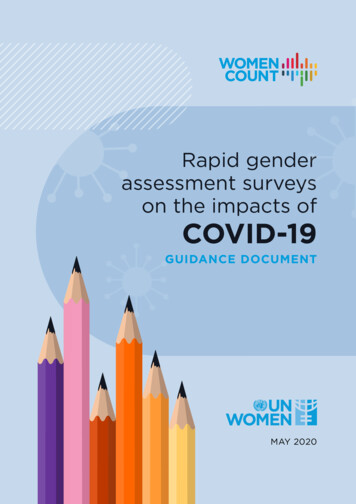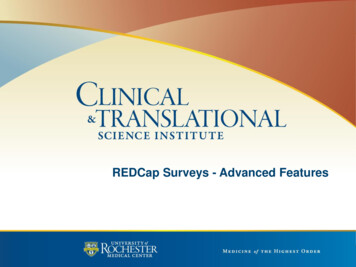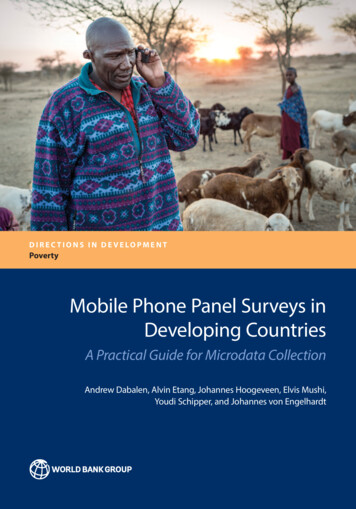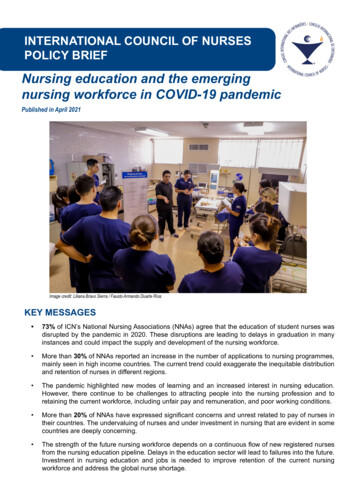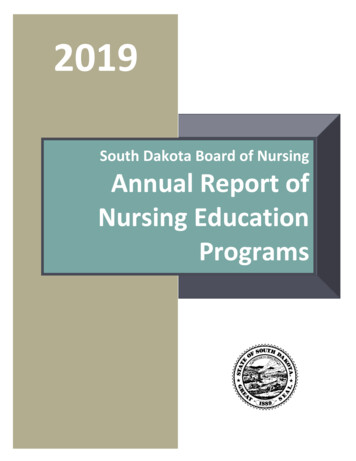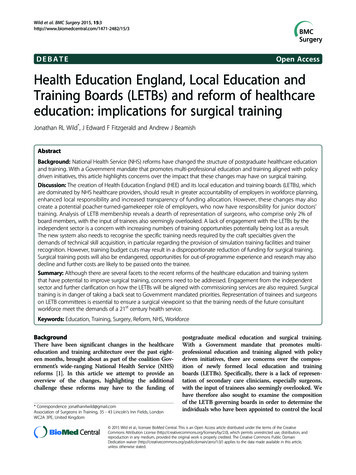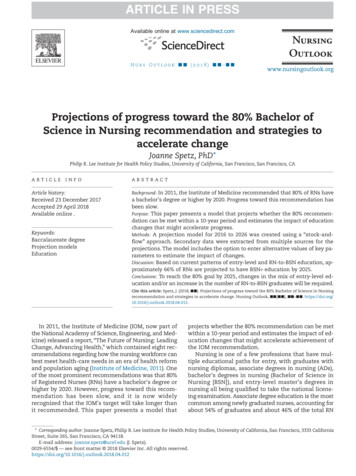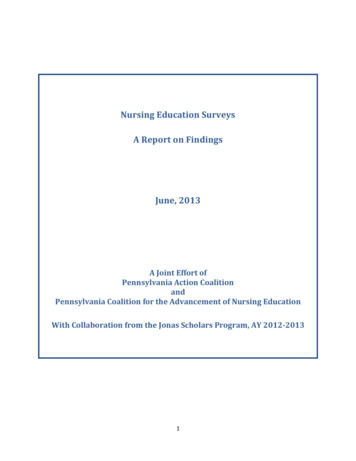
Transcription
Nursing Education SurveysA Report on FindingsJune, 2013A Joint Effort ofPennsylvania Action CoalitionandPennsylvania Coalition for the Advancement of Nursing EducationWith Collaboration from the Jonas Scholars Program, AY 2012-20131
Nursing Education SurveysA Report on FindingsJune, 2013IntroductionIn summer, 2012, members of both the Pennsylvania Coalition for the Advancement ofNursing Education (PCANE) and the Pennsylvania Action Coalition (PA-AC) agreed to surveynursing education programs in the state and to analyze data and disseminate findings toappropriate stakeholders. In fall, 2012, surveys were sent to program directors within thefollowing nursing education sectors: (1) Practical Nursing Programs; (2) Diploma School ofNursing Programs; (3) Associate Degree Nursing Programs; and (4) Baccalaureate and HigherDegree Nursing Programs.Survey questions were tailored as appropriate to each sector. Across pre-licensureregistered nurse and practical nurse sectors, questions were universally asked about thefollowing: (1) adequacy of nursing faculty numbers, both full-time and part-time, to meetcurrent enrollment as well as market demand; (2) rejection rate of qualified applicants due tolack of adequate numbers of full-time and/or part-time faculty; and (3) reasons for inability torecruit and hire additional nursing faculty to meet current and/or projected faculty needs. Forboth diploma schools of nursing and associate degree nursing programs, queries were maderegarding academic progression mechanisms in place to transition to baccalaureate educationprograms, including both articulation agreements and dual agreements. For graduate programspreparing advanced practice registered nurses (APRNs), questions were asked regarding needfor clinical preceptors, from the perspectives of both current need and anticipated marketdemand from qualified applicants. For institutions offering either, or both, the PhD in Nursingdegree or the clinical doctoral degree (the Doctor of Nursing Practice degree, either2
the DNP or the DrNP), questions addressing sources of student funding, faculty grants, andlimitations on expansion of programs were also asked. Appendices A through D include thesurveys as uploaded on Survey Monkey. Survey data was collected from December, 2012,through April, 2013.The surveys were sent to the following individuals: (1) sixty-nine directors of PracticeNursing Programs included on the Pennsylvania Association of Practical Nursing Administratorslist; (2) nineteen directors of Diploma Schools of Nursing obtained from the HospitalAssociation of Pennsylvania’s Council for Health Professions Education and listed as approvedprograms by the Pennsylvania State Board of Nursing; (3) twenty-six directors of AssociateDegree Nursing Programs obtained from the Pennsylvania Colleges of Associate Degree Nursingassociation and listed as approved programs by the Pennsylvania State Board of Nursing; and(4) forty-one directors of baccalaureate and higher degree nursing programs obtained from thePennsylvania Higher Education Nursing Schools Association. The response rate to these surveyswas as follows: (1) Practical Nursing program directors – 43 of 69 surveyed (62.32%); (2)Diploma Schools of Nursing – 19 of 19 surveyed (100%); (3) Associate Degree program directors– 25 of 26 surveyed (96.15%); (4) Baccalaureate and Higher Degree program directors – 41 of41 surveyed (100%).This document provides findings obtained from respondents to these surveys across allfour sectors. The registered nurse data is further divided into the following sections: (1)Diploma Schools of Nursing; (2) Associate Degree Nursing Programs; (3) Graduate APRNPrograms; and (4) Doctoral Programs. The final section contains the Practical Nursing Programfindings. A summary of findings is provided as a conclusion section, followed byrecommendations.3
Diploma Schools of NursingFindings from the nineteen Diploma School of Nursing program respondents (100%response rate) are as follows: Eighteen institutions (97.74%) operating diploma schools were private, not-for-profitorganizations; one (5.26%) was listed as a proprietary institution. Eighteen respondents (94.74%) reported an adequate number of nursing faculty tosupport the anticipated enrollment for Academic Year 2013-2014. None (100%) reported rejection of qualified applicants due to lack of nursing faculty. Five (26.32%) reported current existing vacant faculty lines, including three reportingfull-time vacancies and two reporting part-time vacancies. None (100%) reported the need for new faculty lines to be compliant with regulatorystandards, agency mandates, or accreditation expectations. Reasons checked for inability to hire additional faculty were as follows, if appropriate:Table 1. Reasons for Inability to Hire Additional Diploma Program Nursing Faculty.ReasonPercent Inadequate base funding for faculty lines2; 10.53% Lack of institutional willingness to fund additional faculty lines3; 15.79% 6; 31.58% Low nursing faculty salaries compared to clinical agencies in theregionLow nursing faculty salaries compared to other nursing programsin the regionHigh nursing faculty workload Competition from nursing programs in your region for faculty4; 21.05% 4; 21.05% Inadequate applicant pool of potential nursing faculty in yourregionLack of candidates prepared with skills in education Inadequate numbers of clinical specialty faculty in your region5; 26.32% Unattractive recruitment package offered to attract new faculty toyour institutionOther; please specify: “unable to compete with our five day workweek schedule as compared to a three day work week schedule forthe same salary”4; 21.05% 41; 5.26%3; 15.79%8; 42.11%1; 5.26%
None (100%) reported having articulation agreements or dual admission agreementswith Associate Degree Nursing Programs Eighteen (94.7%) reported having articulation agreements with Baccalaureate NursingDegree Programs in Pennsylvania. For the programs reporting articulation agreements with Baccalaureate Nursing DegreePrograms in Pennsylvania, the following statements describing these agreementsapplied:Table 2. Statements Describing Articulation Agreements with Baccalaureate NursingPrograms in Pennsylvania.Statement Our graduates automatically enroll in the baccalaureate programwithout further review Transcripts of our graduates are evaluated by the baccalaureateprogram prior to enrollment in that program Students graduate with the baccalaureate degree upon completion ofthe full-time course of study without replicating past course content Percent6; 31.6%17; 89.5%5; 26.3%Eight (42.1%) reported having dual admission agreements with Baccalaureate NursingDegree Programs in Pennsylvania. For the programs reporting dual admission agreements with Baccalaureate NursingDegree Programs in Pennsylvania, the following statements describing theseagreements applied:Table 3. Statements Describing Dual Admission Agreements with Baccalaureate NursingPrograms in Pennsylvania.Statement Our graduates automatically enroll in the baccalaureate programwithout further review Transcripts of our graduates are evaluated by the baccalaureateprogram prior to enrollment in that program Students graduate with the baccalaureate degree upon completion ofthe two years equivalent full-time study5Percent4; 21.1%5; 26.3%2; 10.5%
Eighteen (94.73%) Diploma Schools of Nursing had either, or both, articulationagreements or dual admission agreements with Baccalaureate Nursing Degree Programsin Pennsylvania. Five (26.32%) reported having RN-to-MSN agreements with graduate nursing programsin Pennsylvania. These agreements are with Carlow University, Drexel University,Robert Morris University, and Thomas Jefferson University. Table 4 on next page lists institutions with established articulation and dual admissionagreements between Diploma Schools of Nursing and Baccalaureate Nursing Programs.6
Table 4. Articulation and Dual Admission Agreements between Diploma Schools of Nursingand Baccalaureate Nursing Programs.Diploma School ofNursingSt. Margaret School ofNursingThe Washington HealthSystem School of NursingAria Health School ofNursingLewistown HospitalSchool of NursingRoxborough HospitalSchool of NursingArticulation Agreements withBSN ProgramsDual AdmissionAgreements with BSNProgramsChatham University, Penn StateUniversity, La Roche College,Waynesburg UniversityWaynesburg UniversityPenn State UniversityPenn State UniversityThomas Jefferson UniversityMercy Hospital School ofNursing - UPMCJoseph McCloskey Schoolof Nursing at SchuylkillHealthAbington MemorialSchool of NursingCarlow University, Robert MorrisUniversity, Waynesburg UniversityPenn State UniversityWestern PA School ofNursingSharon Regional HealthSystem School of NursingClarion UniversityThomas Jefferson UniversityThomas Jefferson UniversityThomasJeffersonUniversityPenn State UniversityPenn State University, YoungstownState University,Slippery Rock UniversityChatham University, Mount AloysiusCollege, Carlow University, DrexelUniversityPenn State UniversityUniversity of PittsburghMedical CenterCitizens School of NursingChatham UniversityChatham UniversityHeritage Valley SewickleySchool of NursingLa Roche CollegeReading Hospital Schoolof Health SciencesSt. Luke’s School ofNursingOhio Valley HospitalSchool of NursingJameson MemorialHospital School of NursingAlvernia UniversityConemaugh ValleyMemorial Hospital Schoolof NursingRN-to-MSNProgramAgreementMount Aloysius CollegePenn State UniversityLa Roche College,Slippery Rock University, PennState University,Waynesburg University,Duquesne University,Carlow UniversityCarlowUniversity,DrexelUniversityRobert MorrisUniversityRobert MorrisUniversityMoravian CollegeRobert Morris University,La Roche CollegePenn State University, Slippery RockUniversity7Robert Morris UniversityRobert MorrisUniversity
There are fourteen baccalaureate nursing programs that offer articulation agreementswith Diploma Schools of Nursing programs. These institutions include:o Alvernia Universityo Carlow Universityo Chatham Universityo Clarion University Venango Collegeo Drexel Universityo La Roche Collegeo Moravian Universityo Mount Aloysius Collegeo Pennsylvania State Universityo Robert Morris Universityo Slippery Rock Universityo Thomas Jefferson Universityo Waynesburg Universityo Youngstown University There are ten baccalaureate nursing programs that offer dual admission agreements toDiploma Schools of Nursing programs. These institutions include:o Carlow Universityo Chatham Universityo Duquesne Universityo La Roche Collegeo Mount Aloysius Collegeo Pennsylvania State Universityo Robert Morris Universityo Slippery Rock Universityo Thomas Jefferson Universityo Waynesburg University8
Associate Degree Nursing ProgramsFindings from the twenty-five Associate Degree Nursing program respondents (96.15%response rate) are as follows: Sixteen (64%) of the institutions were public, part of the Pennsylvania State System ofHigher Education (PASSHE); four (16%) were State-Related Institutions; four (16%) wereprivate, Catholic; and one (4%) was a private, not-for-profit health care system. Table 5 illustrates the academic degrees awarded by the Associate Degree NursingProgramsTable 5. Types of Degrees Awarded by the Associate Degree Nursing ProgramRespondents.Degree AwardedType of DegreePercentAssociate of Applied Science degree, major in NursingTerminal; workforce11; 44%Transfer11; 44%Terminal; workforce3; 12%Associate of Science degree, a major in NursingAssociate of Applied Arts degree, a major in Nursing Seven (17.10%) reported that other nursing programs were offered in their institutions;one reported a BSN program offered; one reported offering a BSN, an RN-to-BSN, andan RN-to-MSN program; three reported offering RN-to-BSN programs; one reported apractical nursing program; and one reported offering both a practical nursing programand a diploma nursing program. Eighteen (72%) reported an adequate number of nursing faculty to support theanticipated enrollment for Academic Year 2013-2014. Two (8%) reported rejection of qualified applicants due to lack of nursing faculty. Nine (36%) reported current existing vacant faculty lines, including one programreporting five full-time vacancies, two reporting part-time vacancies, and two reportinga mixture of full-time and part-time vacancies. Twelve (48%) reported a need for new faculty lines to admit additional qualifiedapplicants to their programs; of those reporting need for additional faculty, one9
reported the need for new full-time faculty and ten reported the need for part-timefaculty; one reported the need for both full-time and part-time faculty. The range ofnew full-time faculty lines reported as needed to admit additional qualified applicantswas from was one to four, with most requesting respondents indicating a need for onemore full-time faculty. Similarly, for those respondents requesting additional part-timelines to admit additional qualified applicants, the average request was for three parttime lines. Two (8%) reported a current need for new part-time faculty lines for clinical supervisionto be compliant with regulatory standards, agency mandates, or accreditationexpectations. The reasons checked for inability to hire additional faculty, if applicable, were as follows:Table 6. Reasons for Inability to Hire Additional Associate Degree Nursing ProgramFaculty.Reason Inadequate base funding for faculty lines5; 20% Lack of institutional willingness to fund additional faculty lines4; 16% 10; 40% Low nursing faculty salaries compared to clinical agencies in theregionLow nursing faculty salaries compared to other nursing programsin the regionHigh nursing faculty workload Competition from nursing programs in your region for faculty10; 40% 10; 40% Inadequate applicant pool of potential nursing faculty in yourregionLack of candidates prepared with skills in education Inadequate numbers of clinical specialty faculty in your region6; 24% Unattractive recruitment package offered to attract new faculty toyour institutionOther; please specify: (1) “cost;” and (2) “we hire BSN;, MSNs arenot available”1; 4% Percent0; 0%2; 8%7; 28%2; 8%Twenty-four (96%) reported having articulation agreements with Baccalaureate NursingDegree Programs in Pennsylvania.10
For the twenty-four programs reporting articulation agreements with BaccalaureateNursing Degree Programs in Pennsylvania, the following statements describing theseagreements applied:Table 7. Statements Describing Articulation Agreements with Baccalaureate NursingPrograms in Pennsylvania.Statement Our graduates automatically enroll in the baccalaureate programwithout further review Transcripts of our graduates are evaluated by the baccalaureateprogram prior to enrollment in that program Students graduate with the baccalaureate degree upon completion ofthe full-time course of study without replicating past course content Percent10; 40%11; 44%8; 32%Twelve (48%) reported having dual admission agreements with Baccalaureate NursingDegree Programs in Pennsylvania. For the programs reporting dual admission agreements with Baccalaureate NursingDegree Programs in Pennsylvania, the following statements describing theseagreements applied:Table 8. Statements Describing Dual Admission Agreements with Baccalaureate NursingPrograms in Pennsylvania.Statement Our graduates automatically enroll in the baccalaureate programwithout further review Transcripts of our graduates are evaluated by the baccalaureateprogram prior to enrollment in that program Students graduate with the baccalaureate degree upon completion ofthe two years equivalent full-time study Percent4; 16%4; 16%2; 8%One reported having an RN-to-MSN agreement with a graduate nursing program inPennsylvania. La Roche College offers an three degrees with seamlessness betweenlevels—Associate, Baccalaureate, and Graduate Table 9 on next page provides a list of institutions with established articulation and dualadmission agreements between Associate Degree Nursing and Baccalaureate DegreeNursing Programs11
Table 9. Articulation and Dual Admission Agreements between Associate Degree NursingPrograms and Baccalaureate Nursing Programs.Associate DegreeNursing ProgramAllegheny CountyCommunity CollegeBucks County CommunityCollegeButler CountyCommunity CollegeClarion UniversityVenango CollegeCommunity College ofBeaver CountyArticulation Agreements with BSNProgramsDual AdmissionAgreements with BSNProgramsCalifornia University of PA,Capella University,Drexel University,Slippery Rock UniversityImmaculata University, Thomas JeffersonUniversity, Drexel University, LaSalleUniversitySlippery Rock UniversityClarion University Venango CollegeClarion University VenangoCollegeDrexel University, University of Pittsburgh,La Roche College, Slippery Rock UniversityCommunity College ofPhiladelphiaDelaware CountyCommunity CollegeGwynedd Mercy CollegeThomas Jefferson UniversityThomas Jefferson UniversityWest Chester University, Thomas JeffersonUniversityGwynedd Mercy CollegeThomas Jefferson UniversityHarrisburg AreaCommunity CollegeAlvernia University, Capella University,Drexel University, Eastern MennoniteUniversity, St. Davids University, EdinboroUniversity, Immaculata University,Indiana University of PA, Kaplan University,Lancaster General College of Nursing andHealth Sciences, Penn State University,Pennsylvania College of TechnologyPenn State University, Lock HavenUniversity, Pennsylvania State University,Alvernia University, Eastern MennoniteUniversityLa Roche CollegeMillersville UniversityHarrisburg AreaCommunity College atGettysburg CampusLa Roche CollegeLancaster GeneralCollege of Nursing andHealth SciencesLehigh CarbonCommunity CollegeLock Haven UniversityLuzerne CountyCommunity CollegeCedar Crest College, Drexel University,Bloomsburg University, Moravian CollegeDe Sales UniversityLock Haven UniversityMisericordia University, Thomas JeffersonUniversity, Bloomsburg University, EastStroudsburg University12Millersville UniversityLa Roche CollegeLock Haven UniversityMisericordia University,Thomas Jefferson University
Associate DegreeNursing ProgramMercyhurst UniversityNortheast CampusMontgomery CountyCommunity CollegeMount Aloysius CollegeArticulation Agreements with BSNProgramsMercyhurst UniversityDrexel University, Widener University,Gwynedd Mercy College, VillanovaUniversityMount Aloysius CollegeNorthampton CommunityCollegePennsylvania College ofTechnologyPenn State UniversityDe Sales University, Cedar Crest University,Moravian University, Drexel UniversityPennsylvania College of TechnologyReading Area CommunityCollegeUniversity of Pittsburghat BradfordUniversity of Pittsburghat TitusvilleWestmorelandCommunity CollegeSlippery Rock University Dual AdmissionAgreements with BSNProgramsThomas Jefferson UniversityMount Aloysius CollegePennsylvania College ofTechnologyPenn State UniversityUniversity of PittsburghUniversity of PittsburghUniversity of Pittsburg at BradfordPenn State University, Indiana University ofPA, California University of PA, CarlowUniversityThere are thirty-two baccalaureate nursing programs that offer articulation agreementsto Associate Degree Nursing programs. These institutions include:o Alvernia Universityo Bloomsburg Universityo California University of Pennsylvaniao Carlow Universityo Capella Universityo Cedar Crest Universityo Clarion University Venango Collegeo De Sales Universityo Drexel Universityo Eastern Mennonite Universityo East Stroudsburg Universityo Edinboro Universityo Gwynedd Mercy Collegeo Immaculata Universityo Indiana University of PAo Kaplan Universityo Lancaster General College of Nursing and Health Sciences13
ooooooooooooooo La Roche CollegeLa Salle UniversityLock Haven UniversityMercyhurst UniversityMisericordia UniversityMoravian UniversityMount Aloysius CollegePennsylvania College of TechnologyPennsylvania State UniversitySlippery Rock UniversityThomas Jefferso
Roxborough Hospital School of Nursing Thomas Jefferson University Thomas Jefferson University Thomas Jefferson University Mercy Hospital School of Nursing - UPMC Carlow University, Robert Morris University, Waynesburg Un
